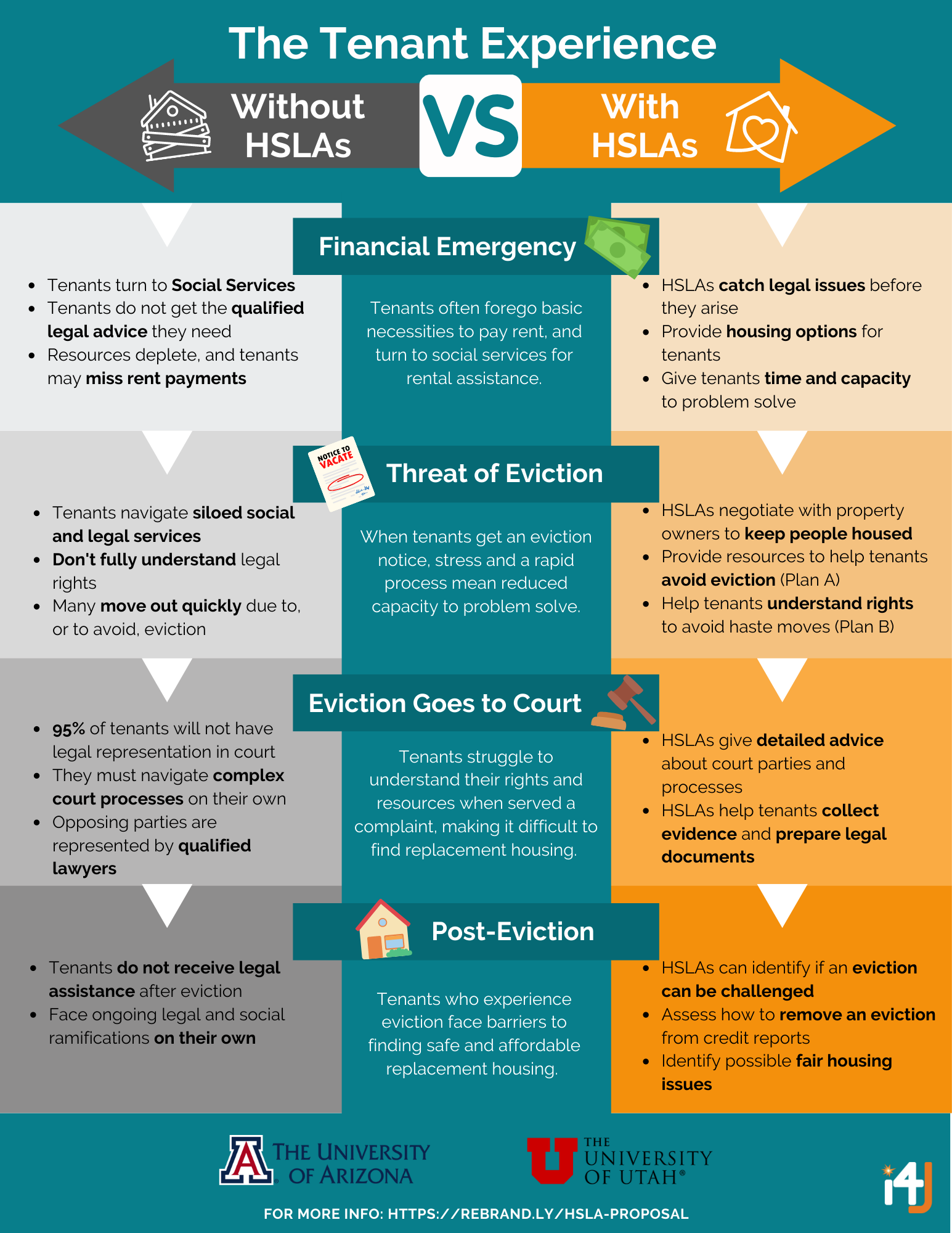Housing Stability Legal Advocate Initiative
Designing a community-based justice worker model for tenants with unmet civil legal needs
To learn more about Housing Stability Legal Advocate training and to apply now, visit Community Legal Education.
-
Housing instability disproportionately impacts lower-income community members, the vast majority of whom are renters. For lower-income community members, housing is simply unaffordable. In Arizona and Utah, there are about 30 affordable housing units for every 100 extremely lower-income renter households, and more than 70% of extremely low-income renters are paying more than half of their income on rent. For severely rent-burdened households, one emergency or unexpected expense could result in eviction, displacement, and homelessness.
Tenants confronted with an inability to pay rent lack the resources and capacity to navigate and secure siloed social and legal services needed to maintain housing stability. i4J's Housing Stability Legal Advocates (HSLAs) are community members from the non-profit social service sector who obtain HSLA certification in the course and scope of their social service work, and embed upstream, trauma-informed, limited-scope legal advice related to housing issues in the delivery of their social services.
As limited-scope justice workers, HSLAs can:
1. Provide limited-scope legal advice in the course and scope of their social service work. For example, a caseworker at a community action agency or a human services campus who assists tenants in securing food and/or applying for utility and rent assistance would also be able to identify tenants that are at risk of eviction and provide legal advice to reduce housing instability risk;
2. Not charge for their services–HSLA legal advice would be provided in the course and scope of free social services, not as a free-standing legal service; and
3. Be limited to providing HSLA services while employed by or volunteering with a non-profit social service organization - HSLAs would not be authorized to set up free-standing, for-profit legal service organizations.
View Project Brief: Leveraging regulatory reform in AZ and UT to advance housing stability
Read Full Report: Housing Stability Legal Advocate Initiative: 2023 Update
Watch: The HSLA Arizona Funder Network Virtual Event
See Our Progress: The HSLA Arizona 2024 Annual Report
-
The HSLA Initiative was authorized for development and launch by the state supreme courts in both Arizona and Utah. For more information about the current status of housing-trained justice workers at i4J, visit our Community Legal Education page!
Arizona Supreme Court Administrative Order 2024-34 (Replacing Administrative Order No. 2023-19, issued January 2023)
Supreme Court of Utah Standing Order No. 16 published March 2023
-
The HSLA Initiative builds off of the momentum of i4J’s prior Community Legal Education Initiatives, and amplifies the voices of over 160 community members in Arizona and Utah collectively advocating for innovative approaches to keeping people housed. i4J is currently engaged in conversations with Arizona and Utah court stakeholders to determine the best way to implement the Initiative in both states.
As the legal profession struggles to expand access for populations that cannot afford legal services under traditional models, whether a professional with legal training but not a J.D. should be permitted to give legal advice is an issue at the forefront of access to justice decision-making across the country. This Initiative is positioned to be a critical, groundbreaking step in the effort to significantly restructure legal regulation and innovate the delivery of legal services to improve access to justice, human services, and housing stability. The research findings generated by this Initiative have the potential to change the delivery of civil legal services for low-income populations nationwide, by creating a new and sustainable tier of civil legal service providers for the non-profit, civil legal aid, and social service communities.


